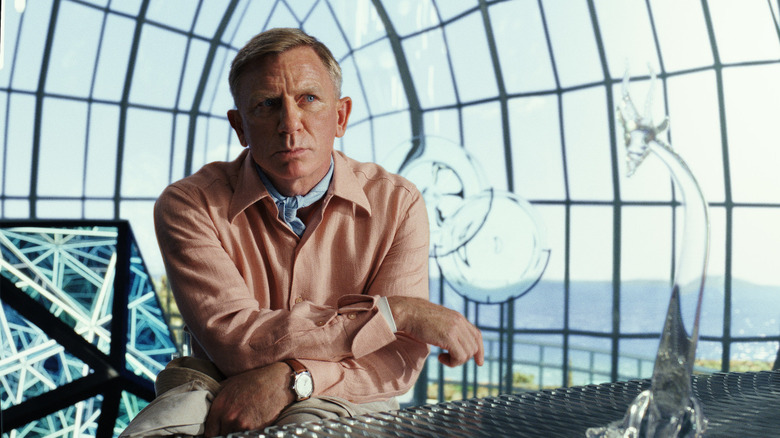
Spoilers ahead for both "Knives Out" and "Glass Onion."
The idea of "true disruption" runs rampant through the new Netflix film "Glass Onion." True disruption, we're told by a very confident billionaire living it up on his private island, comes in many forms. It can come in the form of a viral influencer who pushes questionable medical remedies. It can come in the form of a politician bucking norms regarding worldwide climate change. And it can come in the form of pushing out new energy sources supposedly intended for the benefit of mankind but primarily for the benefit of investors and stakeholders.
Anyone familiar with the work of writer/director Rian Johnson will be unsurprised to know that "Glass Onion," much like its 2019 predecessor "Knives Out," is a force of disruption itself, gleefully upending its own rules by fooling both the audience and many of its characters with information placed in plain sight but obfuscated with deliberate point and purpose. "Glass Onion" is a force for disruption because its one shared aspect with "Knives Out" is an actual, living embodiment of disruption theory: the Southern gentleman-detective Benoit Blanc. Blanc is a shrewd investigator of the truth, as we already know. What "Glass Onion" further proves is how Johnson takes inspiration in the creation of Benoit Blanc from one of the finest screen detectives, in his skepticism and distaste for how the rich live and treat others: Lt. Columbo of the Los Angeles Police Department.
Two Unlikely Sleuths
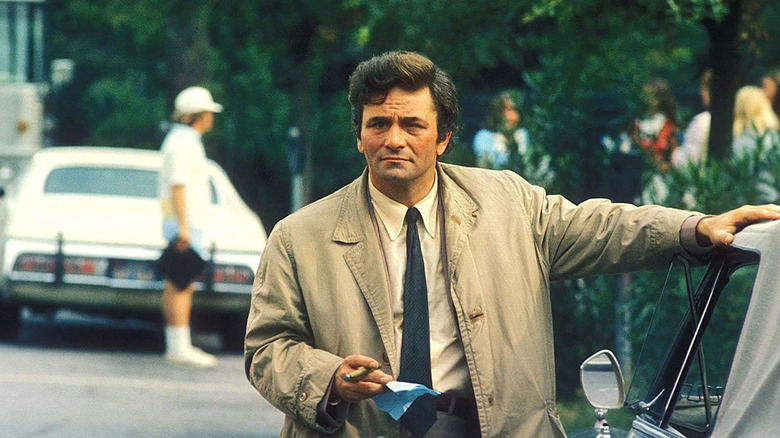
The '70s-era detective portrayed by Peter Falk on television would seem in many ways to be the antithesis of Benoit Blanc (Daniel Craig). Columbo, unlike Blanc, is an actual cop, while Blanc makes a strong point of saying his jurisdiction ends with informing the police of his findings. Columbo's entire being is the dictionary definition of "rumpled," while Blanc is always dressed to the nines (a bit more so in "Glass Onion"). And the joy of watching Columbo work is that we know the answer to whodunnit in any given episode before the detective himself does, because of how the show was structured. "Knives Out," in its own playful storytelling setup, somewhat answered the question of who killed prolific author Harlan Thrombey (Christopher Plummer) by revealing how much more his nurse and caretaker Marta (Ana de Armas) knew of Harlan's death than she initially let on. But even "Knives Out" had more twists and turns, beyond the initial implication that Marta inadvertently gave Harlan an overdose of morphine, as we eventually learn that his slacker grandson (Chris Evans) had engineered the entire plot.
"Glass Onion" doesn't go back to the same well twice, nor does it ape the structure of an episode of "Columbo." It takes a full hour before a character is murdered, and longer for anyone on screen or watching to be informed of whodunnit. In the early days of the pandemic, a group of so-called disrupters – Connecticut governor Claire Debella (Kathryn Hahn), men's rights advocate Duke Cody (Dave Bautista), celeb fashionista Birdie Jay (Kate Hudson), and scientist Lionel Toussaint (Leslie Odom, Jr.) – all separately receive a puzzle-box invitation from their mutual friend, billionaire Elo-–er, sorry, Miles Bron (Edward Norton). (Even recent news regarding a certain bird-named social-media site would not allow the connections between Miles and the billionaire owner of that bird-named site to be missed.) Miles is inviting them for an annual get-together at his island in Greece, so they can "solve" his murder as an elaborate party game. Once there, the group is surprised to see two additional parties: first, Miles' ex-business partner Andi (Janelle Monae), whose work at his company Alpha ended acrimoniously in court. And second, of course, is Benoit Blanc.
Disrupters Have Assembled
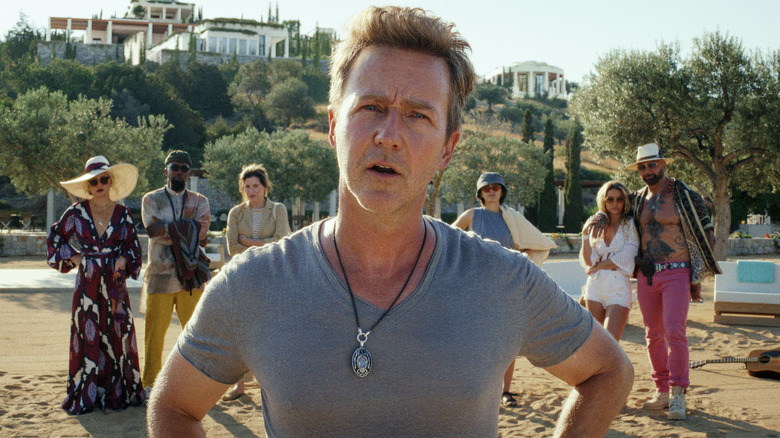
Miles, it turns out, is just as surprised to see Benoit as everyone else is – though our detective claims he received the same elaborate puzzle box, Miles didn't send it and doesn't know who could have done so. But Benoit fits in with Miles' overall vibe, since the detective's exploits are now so well-known that he's raking up the celebrity friends, as glimpsed in an early scene where he plays "Among Us" with Natasha Lyonne, Kareem Abdul-Jabbar, Stephen Sondheim, and Angela Lansbury. (The latter two, who have since passed away, receive dedications at the end. It's a fitting tribute to their mutual connections to the world of mysteries; Sondheim co-wrote the 1973 mystery "The Last of Sheila," and...well, Angela Lansbury will always be Jessica Fletcher, a Columbo-like figure in her own right.) And Miles loves nothing more than a good A-Lister crashing his party, much as he claims to have his whole aura defined by disruption.
Though Benoit looks snazzy, and his reputation precedes him, he is a modernized version of Lt. Columbo. Many episodes of "Columbo" (streaming on Peacock) are all very much about how Columbo comes in conflict with the murdering rich. In "Etude in Black," a second-season installment, he runs up against an arrogant, world-renowned conductor (Falk's longtime friend and collaborator John Cassavetes), at one point interrogating him at the Hollywood Bowl, while being dwarfed by its massive size. That season's finale, "Double Shock," involved Columbo facing off against twin brothers (both played by Martin Landau), one of them a celebrity chef and both of them involved in a murder. The list goes on and on – even the proper series premiere, directed by a young Steven Spielberg, depicts Columbo solving the death of one famous crime writer at the hands of his writing partner. So often, two things are true: Columbo catches a very rich person in the act of cold-blooded murder, and he uses his own perceived lower social standing to disarm the murderer and gradually get them to crack their façade.
As noted, Benoit Blanc looks like he fits in with the eclectic crew of disrupters in "Glass Onion." But he pulls his own version of a Columbo, open-mouthed in awe at Miles Bron's opulent island and the eponymous glass structure at its center, which houses a slick blue Porsche ("because there's nowhere to drive it on the island"). And while Blanc's seeming humility in the face of such expense may be partially genuine, it's there to have the characters let their guard down. (Benoit later dubs it "Southern hokum.") One of the film's great comic moments comes right after Miles reveals the centerpiece of the weekend: a three-day mystery in which the other characters are given clues and meant to figure out who "killed" him. "What do we win?" Benoit asks innocently, to a man who's seemingly won everything and is surrounded by a lot of other people who have also seemingly won everything. When Benoit tries to explain that the concept of the game implied a prize for the winner, he names the iPad as an example of a potential prize. "...Sure, you can have an iPad," Miles offers blankly. And then, about a minute later, Benoit explains the entire mystery without Miles having offered a single clue. Instead of Miles or the others being impressed, they're mostly baffled. (Miles is annoyed, because he paid "Gone Girl" author Gillian Flynn to write up the scenario, "and she's frickin' expensive.")
The True Endgame
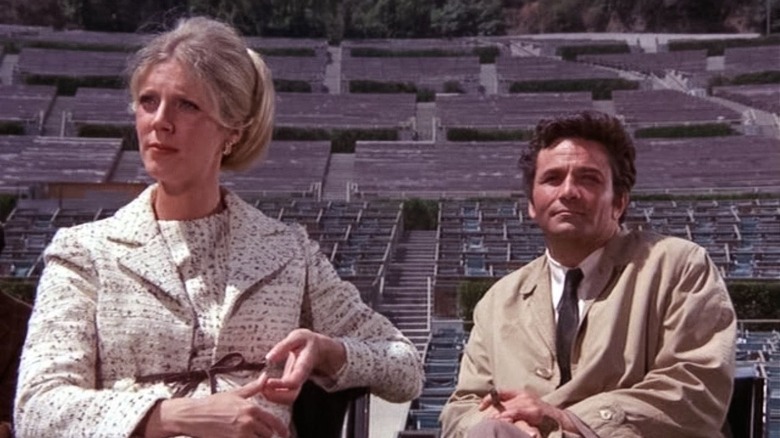
Early on in the run of "Columbo," it's not always evident how much of the detective's reactions to the way the other half lives in the Los Angeles area – from their high-roofed abodes to various opulent works of art hanging nonchalantly – is genuine and how much is a ploy. The same is true of Benoit Blanc, especially when he's confronted with the "Mona Lisa," the genuine article on loan from the Louvre because France needs money to stay afloat in the pandemic. Though Blanc may seem genuflect, he is – of course – hiding something. Halfway through the picture, two major deaths seemingly occur: first, Duke is poisoned, and second, during a power outage that's part of the mystery game, Andi is shot by a hidden assailant. The latter death seems to hit Benoit hard, as he gets visibly emotional at her unexpected murder.
This is where Johnson gets to reveal the true endgame: Andi is dead...but she's been dead for a week. A moment early on – in which Blanc's boyfriend (Hugh Grant) mentions to Benoit that there's a big box at the door for him – is shown now in full. Blanc is visited not just by the puzzle box itself, but by the delivery person: Andi's twin sister Helen, an Alabama schoolteacher reeling from her sister's apparent suicide only two days earlier. Helen is convinced that Andi was murdered specifically because she had proof that she was going to use to destroy Miles, for having stolen her idea and becoming rich off it, and was dangling that proof in front of the other disrupters to see if they'd come clean. And so Blanc, who has already admitted to being so stir-crazy that he needs a case, agrees to go to Miles' island, but only if Helen joins him, pretending to be Andi.
Aside from filling in a number of curious early moments with valuable context – like one shot where "Andi" is seen stumbling to her room that's clarified as her being drunk by having too many of Jared Leto's hard kombuchas – this surprise team-up between Blanc and Helen is further proof of the argument against the rich being espoused throughout "Glass Onion." (The twist regarding Andi and Helen is also a nice nod, if perhaps intentional, to that aforementioned "Columbo" episode where the detective faced off against twin murderers.) The hard-working but not well-off Helen notes that when she and Andi were young, they would put on airs and do a silly voice meant to evoke the upper crust, which they dubbed "Rich B*tch." Though Helen is hard-pressed to square that same sister with the woman who ended up working alongside Miles Bron, she wants to get to the bottom of what happened to Andi, and is all too happy to push back against Miles' so-called friends, whom she correctly dubs "sh*theads."
Just One More Thing
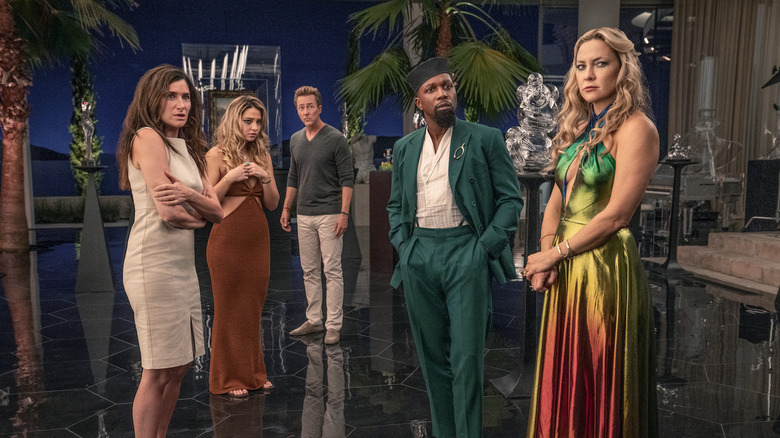
In the end, while everyone is a suspect in Duke's poisoning and Andi's suicide (as it turns out, Helen-as-Andi was inadvertently saved from a gunshot by a well-placed diary), the resolution of who's behind it all is the obvious one: Miles Bron himself, the richest of the rich, killed Andi and Duke, to further ensure that his idea-stealing will remain unknown. That Miles is not only Andi's killer but that he tried to kill Helen-as-Andi via Duke's loaded gun bothers Blanc most of all, because that is yet another idea Miles stole from someone else, Blanc himself. While Bron is perhaps the lowest of the low among this upper-class group, Johnson's script reserves scorn for the other disrupters: it's only after Andi uses a tiny piece of volatile rock that's being used to power Bron's mansion to destroy it that they all agree to speak out against him.
That speaks to the last aspect of "Glass Onion" that's most powerful, a heightened version of the common thread that "Columbo" always boasted. In that latter show, Columbo himself didn't have much crossover with his various suspects: it's not like it was an interconnected universe of some kind. (Thank goodness.) But there was a consistent enough subtextual commentary that the rich in Los Angeles thought they could get away with murder (literally) because the cops were just too stupid and trifling to catch them. In "Glass Onion," it's only briefly commented upon directly that Miles' group seems like a particularly motley crew. (Duke seems modeled at least partially on Alex Jones, while Claire is posited as a fairly liberal politician, as one example of characters seemingly at odds with each other.) Throughout, Benoit and Helen are among the top of the top, whether it's through offhand references to actors like Leto and Jeremy Renner, or cameos from Yo-Yo Ma and Serena Williams (the latter appearing in a particularly funny sight gag at Miles' island).
From the outside looking in, there are various factions of celebrities, some who are more outwardly kind and self-conscious than others, some who thrive on controversy, some who unknowingly court scandal. But from the inside of the glass onion of fame, they are – at least within the film – all hanging out together, thriving until someone from below them sneaks in and offers up a situation of genuine disruption; in this case, it's Helen laying waste to Miles' island, but first breaking every glass objet d'art she can grab. It's easy to love a show like "Columbo" for having its laid-back charms, its fine performances, and its memorable catchphrase, but the writers smuggled in social commentary calmly and methodically. "Glass Onion," a film being released by a disrupter of a streaming service, has its own gregarious charms, its own excellent performances, and plenty of dialogue that seems guaranteed to live on in meme form once this goes digital. But Rian Johnson has smuggled in an all-too-relevant social commentary about the haves and the have-nots, the kind a certain LAPD lieutenant would enjoy very much.
Read this next: The Best Movies Of 2022 So Far
The post How One of Glass Onion's Biggest Themes Directly Connects It to Columbo appeared first on /Film.
0 Comments